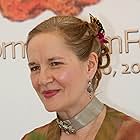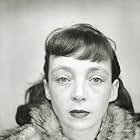Here we have Marguerite Duras' film or anti-cinema of a relationship between a man and a woman who relate to one another over a telephone line. Why anti-cinema, well Duras wants the images to happen in your mind more than on the screen. This is why she gives us "images passe-partout", mostly landscape shots or shots of people thinking, which you could layer many narratives on top, which you have to use as a springboard. We also should have to conjure up the conversations of the pair, we are given only a fragmentary idea of what they talk about. What do two people who fall in love over the telephone talk about? The juvenile in me says phone sex, but I think that's not the point here; this is about souls reaching out across the void.
It's a distraught film, full of desire. Pierre Lhomme's photography and Duras' work bring to life the friezes and statues of Paris so that you're almost in the state the sculptors must have been in. More, you tend to feel the unbridgeable distance between each sculpture.
Conventional thinking says that we ought to forget the desires which we cannot consummate, that we ought not to listen to the cries in the nights of the other abandoned souls, we ought to focus on practical love, on achievement in material wealth, in temporal activities. In the world of Duras however there exists only the anguish of souls' unslaked desire for others. For this reason many revile her, whilst many others exult her, and in the middle a legion of those simply confused by the experimental nature of her movies.
What gets in the way of the two lovers, a leukaemia, which in large part feels metaphorical, and a patriarch, the enormously wealthy and influential father of F.
Occasional flashes of political thought are judiciously added, Duras speaks derisively of the inhabitants of the cemetery of Père-Lachaise, Napoleonic bankers and generals - selfish complotters, puppeteers. The world they have created one where love is seeded on rocky ground.
What lingers long after, is the hypnosis of Duras' voice, black tulip lamps, black cast iron park benches, a tumult of feeling, the dancing violin of Amy Flamer.














